- Home
- Parnell Hall
The Anonymous Client sw-2 Page 10
The Anonymous Client sw-2 Read online
Page 10
“No. We’ll let it pass. The fact is he asked you to bring it?”
“Yes.”
“The same list you received from him Tuesday and traced to Bradshaw?”
“Yes. The same list.”
Dirkson nodded grimly. He turned to Steve Winslow. “All right, Winslow. You’ve refused to answer questions. That’s one thing. Concealing evidence is another. Now, I want to know right now if you have that list.”
“Yes, I have the list,” Steve said. “But as far as I know, it has nothing to do with the murder.”
“Well, I’m telling you that it does,” Dirkson said. “I am hereby informing you that that list of numbers is a valuable piece of evidence in a murder case, and I am asking you in my official capacity as District Attorney to turn it over to the police. Now then, do you intend to do so?”
“Certainly,” Steve said. He produced the list and passed it over to Stams. “I’d hate to make Sergeant Stams go to the trouble of having me frisked again.”
Sergeant Stams whipped a notebook from his pocket and began comparing numbers.
“Now then,” Steve said. “You’ve got what you wanted. Tracy and I aren’t talking, and Taylor’s made his statement. I think this is where we came in.”
Dirkson shook his head. “I’m afraid not, Winslow. I warned you what would happen if I connected you with those thousand dollar bills.”
“You can’t hold me without a warrant,” Steve said.
Dirkson shook his head sadly. “I’m trying to give you a break. If you cooperate, I might be able to save you the embarrassment of a formal arrest. But if you want me to swear out a warrant, I will.”
“You don’t have the grounds to issue a warrant.”
“I didn’t before, but I sure do now. Those serial numbers clinch the case. Bradshaw withdraws the bills from the bank Monday. You get the numbers Tuesday. Bradshaw gets bumped off Wednesday. The bills are found in his pocket, and you’re found in his apartment. Now put all that together and tell me if I can get a warrant.”
Sergeant Stams cleared his throat. “Excuse me, but-”
“Just a minute,” Dirkson said. “I just want to make sure Winslow knows where he stands. Now then, Winslow, you’re not leaving here until you answer some questions. We can do it the easy way or the hard way. It’s entirely up to you.”
Stams cleared his throat again.
“Yes, what is it?” Dirkson snapped.
“I’m sorry,” Stams said. “But there’s been some kind of flimflam here. The numbers on the list don’t match.”
“What?”
Stams shook his head. “That’s right. None of the numbers match. Winslow must have switched lists.”
Dirkson’s face began to purple. “Son of a bitch!” he hissed. “By god, Winslow, if you switched lists-”
“You’ll have a hell of a time proving that,” Steve said, “after the bank teller gets through testifying that the numbers are genuine.”
Dirkson hesitated a second, trying to gauge if Winslow was bluffing. He figured he couldn’t be. Not if he expected the bank teller to back him up. “Damn it,” Dirkson said, “if you didn’t switch lists, then you switched the bills themselves.”
“That’s a fine theory,” Steve said, “if you can find any way to prove it, be sure to let me know. In the meantime, I’ve done all I can here. Tracy, Mark. I think we’ve taken up enough of these gentlemen’s time. After all, they have a murder to solve.”
Steve bowed to Stams and Dirkson, and ushered Tracy and Mark Taylor out.
17
Tracy Garvin could hardly contain herself. She was seated across the table from Steve Winslow in a small diner three blocks from the courthouse. Steve had brushed aside all her questions, even after Mark Taylor, who didn’t want to hear the answers, had hailed a cab and beat a hasty retreat back to his office. Now she waited in mounting frustration while a tired waitress plodded over and slid cups of coffee in front of them.
As the waitress departed, Tracy looked up at Steve and said, “Now?”
Steve dumped cream in his coffee. “Yeah, now.”
“What happened?”
“You first. You heard it on the news, right?”
Tracy gave him an exasperated look, but realized argument would be futile. He wasn’t going to talk till she did. “Yeah. I’d gone home, and I told Mark Taylor to call me if anything happened, but he hadn’t called, and I was listening to the radio, you know, in case they had more details about the Harding thing. Then the news came on about Bradshaw. I called information and your number was listed, so I tried to call you. Of course, you weren’t there. So I figured he’d called you and you’d beat it to Bradshaw’s apartment. So I hopped a cab and went over there.”
“And what happened?”
“You know what happened. I walked into a trap.”
“How?”
“I was stupid. When I got to the building there were no cop cars, nothing. I couldn’t understand it. I mean, this was a murder site. I thought maybe I got the address wrong. I went to a pay phone on the corner and called information, asked them if they had a David C. Bradshaw at that address. They did. I went back to the building. I went up the steps. And I tried to get in.”
“How?”
“What do you mean?”
“What did you do?”
“I rang the bell.”
“Good.”
“What do you mean, good.”
“Dirkson is going to try to prove you were trying to break into that apartment. If the cops have to testify you were ringing the doorbell, it weakens their case.”
“What case?” Tracy cried. “Look. Please. I can’t take it anymore. Just tell me what is going on.”
He did. He told her all of it. From finding Bradshaw’s body to his interview with Marilyn Harding to his dinner with Mark Taylor. The only thing he left out was the part about typing the note on Bradshaw’s typewriter and throwing it out the window. He wasn’t about to make her an accessory to concealing evidence.
She listened, fascinated, till he was finished. “So that’s why Mark Taylor didn’t mention the letters.”
“Yeah. He wasn’t happy about it, but he did it.”
“Why are the letters so important?”
“They’re the key to the whole thing. I’m withholding evidence from the police. So are you. We’re doing it by relying on the law of privileged communications. Well, you can’t have a privileged communication without a client. Those letters show I haven’t got a client.”
Tracy frowned. “Right. We’re right back where we started. Who the hell’s the client?”
Steve shrugged. “You got me. I was all but convinced it was Marilyn Harding. I went out there and started questioning her. She could have told me to go to hell, but she didn’t. She answered all my questions, and some of them were pretty damn impertinent. The way I saw it, the only way that made sense was if she sent me the letters.
“So I sprung the Bradshaw murder on her. That hit her hard. But she tried to pull an innocent act. Then I told her about Miltner’s detectives. I figured that would break her. I was all set for her to reach down the front of her dress and pull out the torn half of a dollar bill. Instead, she went to the phone and called her lawyer, who advised her to throw me out of the house. You could have knocked me down with a feather.”
“Is it true what you said? That as your secretary, I don’t have to testify?”
Steve shrugged. “It’s fine line. They can’t make you testify as to confidential communications. Going to Bradshaw’s apartment is something else. You are an active participant. You did something, and they can question you about it.”
“Then eventually I’ll have to talk?”
He shook his head. “No. That’s why it’s a fine line. I’ll argue that the reason you went to Bradshaw’s apartment was because of something you learned from a confidential communication from a client, and therefore asking you why you went there is the same thing as asking you to reveal that confident
ial communication.”
“But there’s no client.”
“Right.”
“So what’s going to happen now?”
Steve took a sip of coffee. “Now we wait.”
“For what?”
“I don’t know. But I wouldn’t be too surprised if Dirkson drags me in front of the grand jury and tries to get me indicted as an accessory.”
“How could he do that?”
“He’s going to claim I took some evidence out of Bradshaw’s apartment and managed to ditch it somewhere in the building. He’ll claim I sent you to get it.”
Tracy’s face fell. “Shit. It’s all my fault.”
To a certain extent it was. And Steve had uncharitably been thinking that very thing. But faced with Tracy’s distress, he wasn’t about to say so. And she had clammed up on Dirkson.
“Don’t be silly,” he said. “That’s what he’s going to try to do. He can’t prove it, and I think he knows it.”
“Oh.”
Steve pushed back his coffee cup. “Come on. Let’s go.”
Tracy looked at him. “Where?”
Steve looked at his watch. “I’m putting you in a cab. It’s nearly two, and I need you to open up the office tomorrow morning.” He smiled. “After all, I still have twelve days left of your services.”
18
Mark Taylor, showing the ill effects of a sleepless night, slouched in Steve Winslow’s clients’ chair and folded open his notebook.
“O.K., Steve, here’s the pitch. The police are still holding Marilyn Harding. She won’t talk, but her lawyer’s talking plenty. He’s filing a writ of habeas corpus, and demanding they either charge her or release her. So far they haven’t done either, but talk is they’ll charge her by this afternoon. Rumor has it the only reason Dirkson’s hanging back is he can’t decide which case he’d rather try her on first.”
“It’ll be the Bradshaw case,” Steve said.
“How do you know that?”
“Because that way he can drag in the Harding murder to prove motive. If he tried her on the Harding murder first, he’d have a devil of a time trying to tie the Bradshaw murder in with it. The minute he mentioned Bradshaw, Fitzpatrick would start screaming prejudicial misconduct, and Dirkson would find himself in a nasty predicament. Fitzpatrick might even get a mistrial out of it. But by trying her for the Bradshaw murder, Dirkson can prejudice the jury by dragging in the Harding business. And to top it off, he doesn’t even have to get a second-degree murder verdict. If he can convict her of anything at all, even manslaughter or criminally negligent homicide, he’s home free. ’Cause then he’ll turn around and try her for the murder of her father, and when he does, he can impeach her testimony by showing she’s been convicted of a felony. After that she won’t stand a chance. The jury will decide she’s a habitual killer, and they’ll return a guilty verdict without even thinking. Dirkson’s smart enough to realize that, so that’s what he’ll do.”
Taylor shrugged. “Well, either way the case sure looks black for her. The money they found on Bradshaw’s body turned out to be hers.”
“You sure?”
“Got it from the horse’s mouth.”
“Shit. That doesn’t look too good, does it?”
“You don’t know the half of it. Miltner’s men have spilled everything. I don’t know what they said, and I don’t know what time Marilyn called on Bradshaw last night, but from the way the cops are acting, you can bet it was right around 5:30.”
Steve frowned. “Did the autopsy surgeon fix the time of death?”
“Sure. Between 5:15 and 5:45.”
Steve whistled. “That’s sticking his neck out.”
“Sure is. Fitzpatrick should have a field day getting him to admit that he’s basing his testimony on non-medical factors.”
“Sure,” Steve said. “That’ll make Fitzpatrick look good, but in the long run all it will serve to do is to point up to the jury how conclusive those non-medical factors are.”
Mark shrugged. “Well, that’s your department.”
“Wrong. That’s Mr. Fitzpatrick’s department. I have nothing to do with the case.”
“I wish you’d told me that before I stayed up all night getting you this information.”
“It’s good practice for you, Mark. Keeps you on your toes. So what else? What about the murder weapon?”
“Apparently it was Bradshaw’s. It’s a large carving knife from a set of six. The other five are in a drawer in Bradshaw’s kitchen. Dirkson isn’t too happy about that.”
“Why not?”
“The way I get it, he figures it’ll be hard to prove premeditation if Marilyn killed him with his own knife.”
Steve frowned. He thought that over. “No, that’s not right. If she killed him in cold blood, it doesn’t matter when she decided to do it. See, most people think premeditation means the crime was thought out and planned well in advance. It doesn’t. All it means is that the crime was committed deliberately and not in the heat of passion. If Marilyn went into the kitchen to make a drink, opened the drawer, saw those knives, and couldn’t resist the temptation to use one, that’s still premeditated murder, and Dirkson can get her on it.”
“In that case, I can’t see what Dirkson is so worried about.”
“Neither can I. Especially since all he really needs to do is convict her of manslaughter.”
“Then how do you account for it?”
Steve thought a moment. He smiled. “I have one theory that you probably won’t care for.”
“What’s that?”
“That Dirkson isn’t worried at all. That he deduced from our finding Tracy Garvin in his office last night that there must be a leak at headquarters, and therefore he’s handing out this crock of shit so your man won’t find out what he’s really up to.”
Taylor made a face. “You’re right.”
“About my theory?”
“About my not caring for it. I’ve been up all night listening to this crock of shit.” Taylor’s eyes widened. “Jesus, Steve, do you suppose the bit about the bills being traced to Marilyn is phony too?”
“I would tend to doubt it,” Steve said. “Since it’s on the front page of the Daily News.”
Taylor shook his head. “Aw, fuck. Not only do I stay up all night listening to the shit put out by the D.A.’s office, but the only real information I come up with I could have got by buying the morning paper.”
“Yeah, but I wouldn’t pay you overtime to buy the morning paper.”
“Hell, I’m not doing this for the money. I’m doing this so you’ll keep me out of jail.”
“You’re not in there yet.”
“Right. Thanks to my lucky stars and ten serial numbers that conveniently failed to match. You didn’t by any chance switch those numbers around, did you Steve?”
“If I had, would you want to know?”
“Fuck no!” Taylor said. “Never mind. I withdraw the question.”
Steve grinned. “It’s all right. Just for your peace of mind, I didn’t tamper with the list.”
“You didn’t?”
“Of course not. You saw the list yourself.”
“Sure. Just like a volunteer from the audience sees the magician’s ordinary deck of cards.”
“The bank teller can vouch for the list, Mark. By now even the cops will have to admit it’s genuine. What Dirkson’s going to accuse me of is switching the money.”
“You mean taking ten thousand dollars of Marilyn Harding’s money and planting it on the corpse in place of Bradshaw’s ten grand?”
“That’s right.”
“Shit, Steve, what the hell could you expect to gain by that?”
“Fortunately, I don’t have to answer that question. Dirkson does, and that undoubtedly is one of the things he’s really worried about.”
“Gonna sit back and make him prove you guilty beyond a reasonable doubt?”
“No joke. That’s exactly what I may wind up doing.” Steve rubbed his
head. “All right. What about the witness?”
“What witness?”
“The woman who called the police.”
“Oh. Margaret Millburn. Well, there you know as much as anyone. She heard an altercation and called the cops.”
“What kind of altercation.”
“What do you mean?”
“Physical or verbal?”
“I gather both.”
“Then she must have heard the assailant’s voice.”
“That’s right, but not well enough to identify it.”
“How do you know that?”
“Because the police haven’t arranged for her to hear Marilyn’s voice.”
“You sure?”
“Positive. The police finished with the Millburn woman and put her back in circulation before Marilyn Harding was picked up. She hasn’t been near the police station since. That confirms my report that Miss Millburn didn’t actually see Marilyn Harding, and indicates she didn’t hear the argument distinctly enough to recognize voices.”
“Could she hear them well enough to tell if the other party was a man or a woman?”
“If the cops know, they’re not letting on.”
“What about Miss Millburn?”
“What about her?”
“You said the cops put her back in circulation?”
“That’s right.”
“What’s to stop you from having a little chat with her?”
“Just one thing, Steve. You’re forgetting she lives next door to Bradshaw’s apartment. I wouldn’t go near the place right now if my life depended on it.”
“Right,” Steve said. “They’d figure you were after the evidence I ditched.”
“I got the dope on her anyway,” Taylor said. He referred to his notebook. “She’s twenty-eight and she’s a divorcee. Millburn is her maiden name. She was married to a used car salesman named Buckley. Apparently he tried to trade her in on a new model, so she went to Reno, established a six months’ residence, and got a divorce. That was three years ago. She moved here three months ago. She does nothing in the line of work, and seems to be living off her alimony.”

 Clicker Training
Clicker Training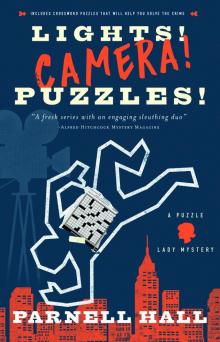 Lights! Camera! Puzzles!
Lights! Camera! Puzzles!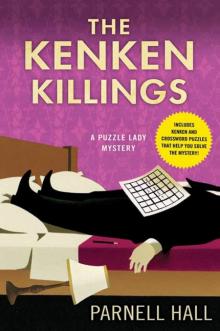 The KenKen Killings
The KenKen Killings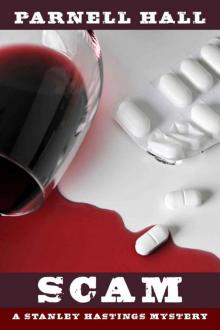 12-Scam
12-Scam The Puzzle Lady vs. the Sudoku Lady
The Puzzle Lady vs. the Sudoku Lady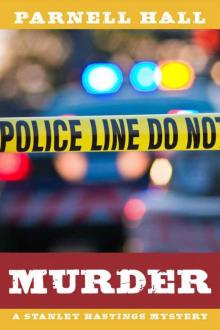 2 Murder
2 Murder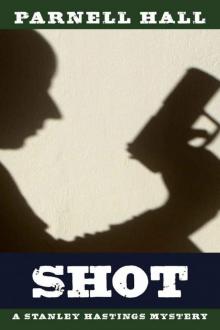 7 Shot
7 Shot You Have the Right to Remain Puzzled
You Have the Right to Remain Puzzled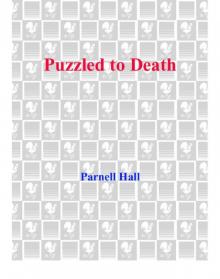 Puzzled to Death
Puzzled to Death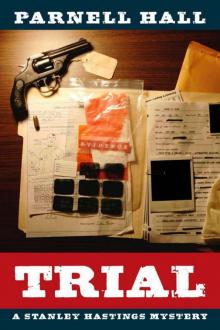 11-Trial
11-Trial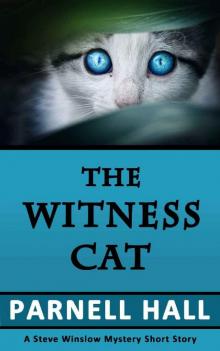 The Witness Cat (Steve Winslow Mystery)
The Witness Cat (Steve Winslow Mystery) With This Puzzle, I Thee Kill
With This Puzzle, I Thee Kill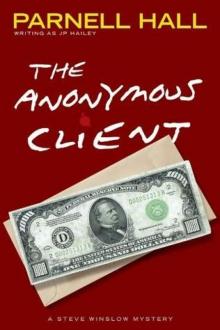 The Anonymous Client sw-2
The Anonymous Client sw-2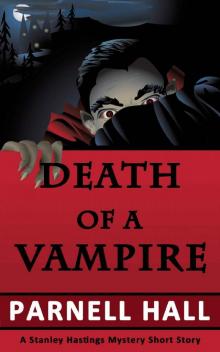 Death of a Vampire (Stanley Hastings Mystery, A Short Story)
Death of a Vampire (Stanley Hastings Mystery, A Short Story)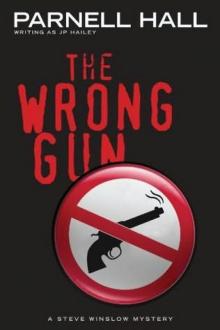 The Wrong Gun sw-5
The Wrong Gun sw-5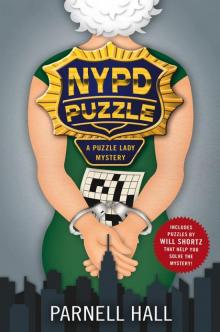 NYPD Puzzle
NYPD Puzzle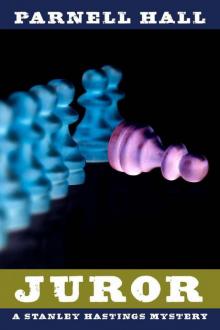 6 Juror
6 Juror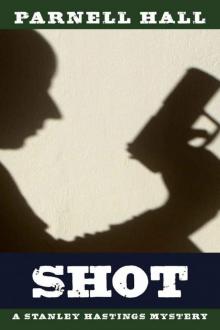 07-Shot
07-Shot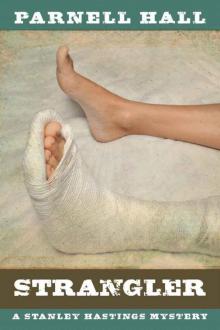 04-Strangler
04-Strangler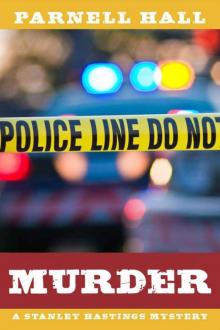 02-Murder
02-Murder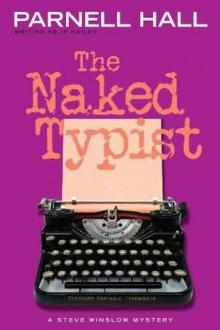 SW04 - The Naked Typist
SW04 - The Naked Typist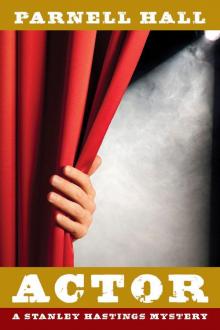 Actor
Actor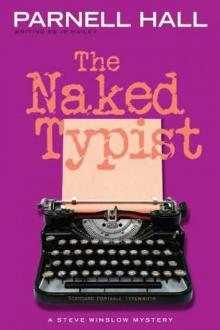 The Naked Typist sw-4
The Naked Typist sw-4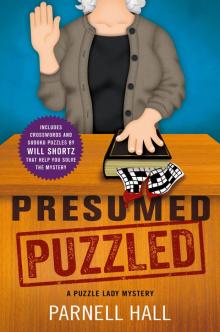 Presumed Puzzled
Presumed Puzzled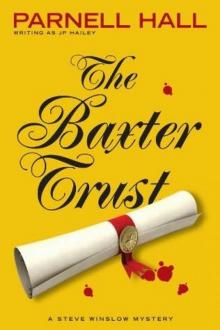 SW01 - The Baxter Trust
SW01 - The Baxter Trust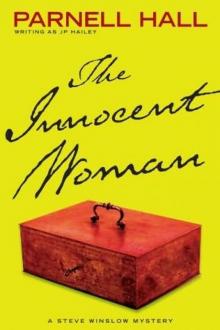 SW06 - The Innocent Woman
SW06 - The Innocent Woman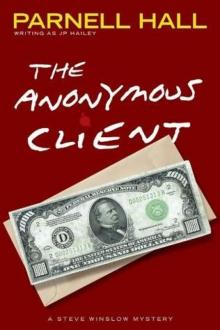 SW02 - The Anonymous Client
SW02 - The Anonymous Client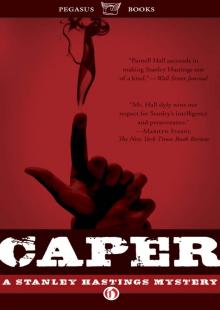 Caper
Caper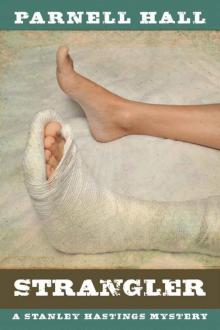 4 Strangler
4 Strangler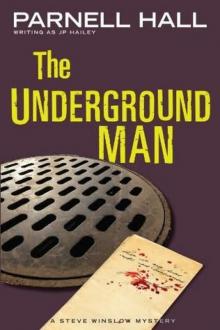 The Underground Man sw-3
The Underground Man sw-3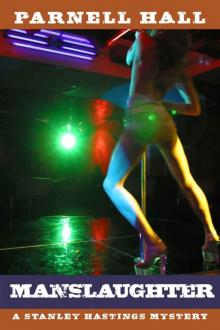 Manslaughter (Stanley Hastings Mystery, #15)
Manslaughter (Stanley Hastings Mystery, #15)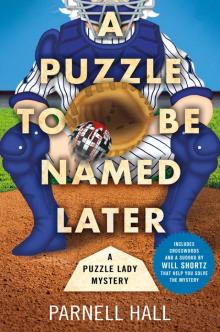 A Puzzle to Be Named Later--A Puzzle Lady Mystery
A Puzzle to Be Named Later--A Puzzle Lady Mystery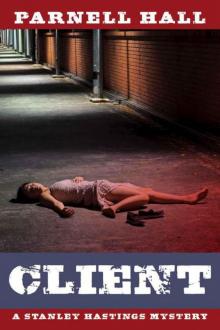 05-Client
05-Client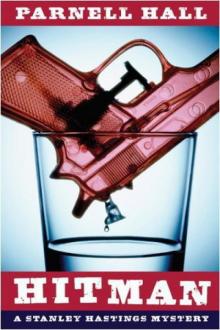 16 Hitman
16 Hitman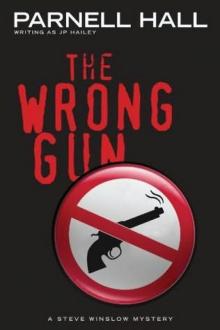 SW05 - The Wrong Gun
SW05 - The Wrong Gun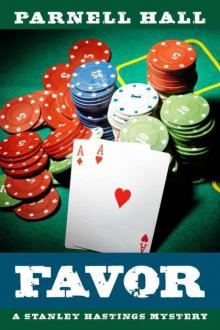 3 Favor
3 Favor Last Puzzle & Testament
Last Puzzle & Testament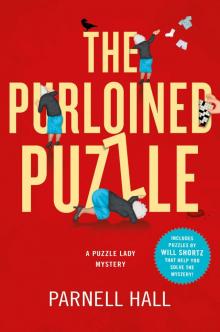 The Purloined Puzzle
The Purloined Puzzle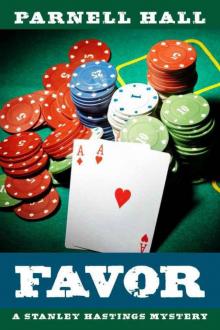 03-Favor
03-Favor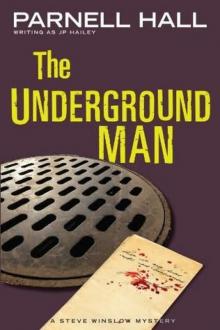 SW03 -The Underground Man
SW03 -The Underground Man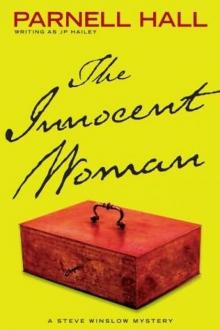 The Innocent Woman sw-6
The Innocent Woman sw-6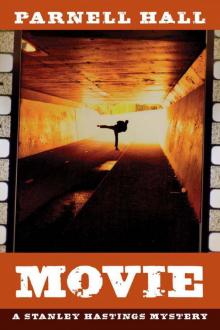 10 Movie
10 Movie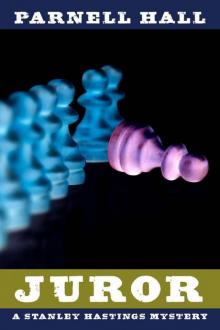 06-Juror
06-Juror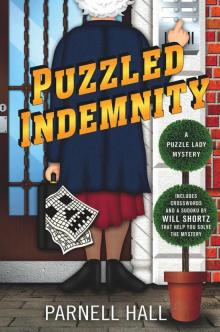 Puzzled Indemnity
Puzzled Indemnity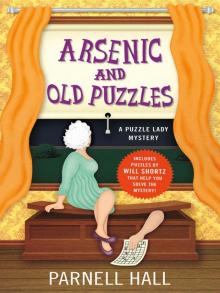 Arsenic and Old Puzzles
Arsenic and Old Puzzles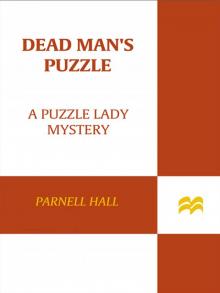 Dead Man's Puzzle
Dead Man's Puzzle Safari
Safari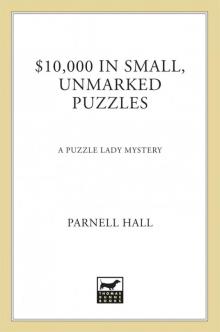 $10,000 in Small, Unmarked Puzzles
$10,000 in Small, Unmarked Puzzles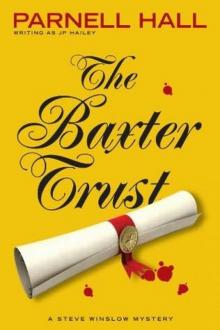 The Baxter Trust sw-1
The Baxter Trust sw-1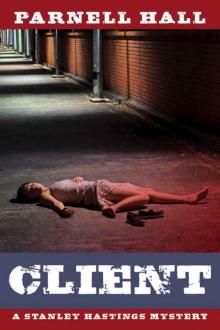 5 Client
5 Client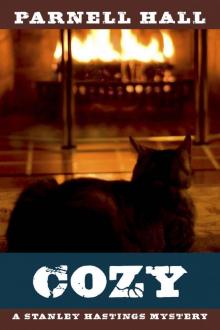 Cozy (Stanley Hastings Mystery, #14)
Cozy (Stanley Hastings Mystery, #14)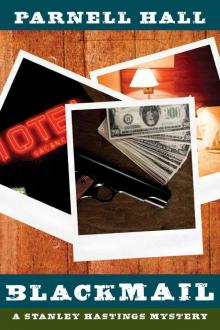 Blackmail
Blackmail A Puzzle in a Pear Tree
A Puzzle in a Pear Tree A Clue for the Puzzle Lady
A Clue for the Puzzle Lady Clicker Training (Stanley Hastings Mystery, A Short Story)
Clicker Training (Stanley Hastings Mystery, A Short Story)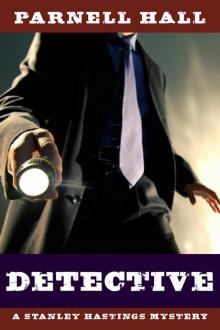 Detective (Stanley Hastings Mystery Book 1)
Detective (Stanley Hastings Mystery Book 1)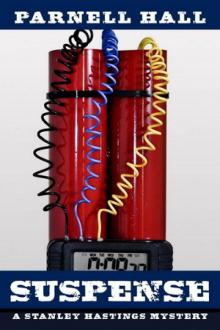 13 Suspense
13 Suspense